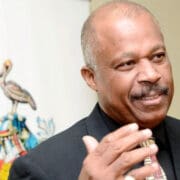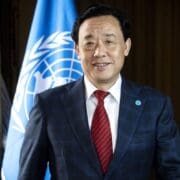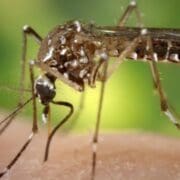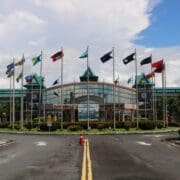Black Immigrant Daily News
By Sydney Allicock, Dr. Carolyn Walcott, Dr. Terrence Blackman
The indigenous peoples of Guyana, known locally as Amerindians, comprise nine distinct groups, each with their own unique culture and traditions, three in coastal areas and six in the forest and savannah areas of the interior. The indigenous peoples, Arawaks, Wai Wai, Caribs, Akawaio, Arecuna, Patamona, Wapixana, Macushi, and Warao, are approximately 90 thousand strong and are the fastest-growing population of the six ethnic groups of Guyana. There are over two hundred and fifteen Amerindian villages and communities.
Amerindian life in Guyana is governed by the Amerindian Act established in 2006, and both past and present administrations have acknowledged Amerindians by granting them legal land ownership. As a result, Amerindians are the second largest land and forest owners after the government of Guyana.
The Amerindian way of life is based on subsistence, a cooperative approach, living in harmony with nature, and following the laws of nature. Amerindians believe that there are four elements of true life: fresh air; pure water; sunlight; and common sense; without this, nothing survives. Amerindians do not sell land; the land is their mother, and many Guyanese Amerindians still speak their native tongue.
The Arawak, the largest indigenous group in Guyana, located mainly in the country’s coastal regions, are known for their pottery and basket weaving. The Carib are known for their traditional lifestyle, closely tied to the natural environment. They have a strong connection to the land and the rivers and are known for their fishing and hunting skills. The Wai Wai, located in the remote southern region of Guyana, are known for their self-sufficiency and close relationship with the natural environment. They are also known for their traditional hunting and fishing practices and their knowledge of medicinal plants. The Warao, located mainly in the northern regions of Guyana, and known for their traditional fishing, hunting, and agriculture practices, have a rich cultural heritage that includes traditional music and dance. Finally, the Makushi are located mainly in Guyana’s central and southern regions and are known for their traditional farming practices and knowledge of medicinal plants.
The National Toshaos Council represents all the Indigenous peoples of Guyana, and the Amerindian Purposes Fund, which still lacks complete functionality, is supposed to do business on behalf of Guyana’s Amerindian community.
With the development of oil and gas reserves in the country, these indigenous communities have been and will continue to be affected positively and negatively. In this essay, we explore the challenges and opportunities that indigenous communities in Guyana face in the emerging fossil fuel extraction economy. The panelist on GBJ’s Transforming Guyana Episode VII: Guyana’s Indigenous Peoples and the Oil and Gas Economy serve to inform our reflections.
Guyana’s recent sale of 30 percent of its carbon credits to Hess Corporation to the tune of US$750 million and the allocation of 15 percent of the proceeds from that sum to the indigenous communities across the country is the most recent manifestation of the intersection between the oil and gas economy and Guyana’s Indigenous Peoples. The sale of carbon credits is a mechanism that countries and companies will use to offset their greenhouse gas emissions by purchasing credits from other countries or entities that have reduced their emissions below their targets. Guyana has vast rainforests which act as a carbon sink, and the government has been selling carbon credits to companies to monetize the environmental services provided by its forests.
Key Amerindian stakeholders, however, question the capacity of the indigenous communities to absorb and harness the resources effectively to the benefit of the community without an existing menu of prerequisites. While many have acknowledged the coordinating role of the National Toshaos Council in advancing the aspirations of Guyana’s indigenous communities, they simultaneously cite the lack of training interventions, particularly within Guyana’s most populous indigenous regions, as potentially undermining sustainable development and inclusion of indigenous citizens. Key indigenous stakeholders believe that Guyana’s First Peoples may be unable to optimally derive the benefits from the carbon credits and wider oil sector without additional technical capacity and the appropriate training in the service and agricultural industries, where the essential components of local content engagement with the oil and gas industry are located. They have proposed the establishment of an indigenous bank and training in environmental and natural resources conservation as critical educational components that must be facilitated through direct involvement of the state, private sector, Hess, and members of the Diaspora if the actual capacity is to be met.
Florence Alexi La Rose, a local consultant on indigenous development, has proffered a micro-level approach to building local capacity through meaningful engagement. She posits that education, training, and access to critical information on available opportunities in the oil and gas sector are precursors to the inclusive engagement of hinterland communities. Even with the local content act’s institution, La Rose has suggested that members of the indigenous community across Guyana can be excluded from opportunities due to a lack of awareness, and linguistic barriers only further compound the situation for the indigenous population. One of the most significant challenges facing the community today is the need for meaningful consultation with companies and governments about developing projects in their communities. Stakeholder intentionality around substantive consultation is likely to preempt the emergence of issues these communities face in adapting to the already evident broader impacts of the new Oil & Gas economy on the larger Guyanese society, i.e., changes in prices, employment opportunities, and access to services.
Despite the potential challenges the new Oil & Gas economy poses to indigenous communities in Guyana, there are also opportunities for these communities to benefit from the industry. One of the most significant opportunities is the potential for the development of Indigenous-owned businesses connected to the oil and gas value chain. For example, suppose Indigenous people can increasingly own and operate companies that provide various services to the fossil fuel industry, from exploration and production to pipeline construction and operations. In that case, they will be able to provide employment opportunities for indigenous people and help communities generate revenue from the fossil fuel industry. In addition to these Indigenous-owned companies, various government and private sector initiatives can help Indigenous communities deploy existing cultural assets to benefit from the fossil fuel extraction economy. These initiatives could include targeted tax incentives, capital access, and other technical support for Indigenous-owned businesses.
The emerging Oil & Gas economy is a complex system that has existed for centuries in many parts of the world, including Guyana. This system has significantly impacted indigenous communities globally, and we can expect the same in Guyana, both positively and negatively. Guyana’s stakeholders must be intentional in their engagement with the Amerindian community. We have outlined some challenges and potential opportunities that Amerindians in Guyana face and will continue to face and some strategies they can use to navigate Guyana’s emerging oil and gas economy. The Oil & Gas economy will inevitably have an impact on Amerindian communities, and it is essential to ensure that Amerindians, in all their communities, are adequately consulted and supported to ensure that, as a community, they benefit from the industry. We close by reiterating the Amerindian maxim: The four elements of true life are fresh air; pure water; sunlight; and common sense; without which nothing survives.
——————–
Mr. Sydney Allicock, MP (former) Minister of Indigenous Peoples’ Affairs of the Republic of Guyana, South America is from the North Rupununi, Upper Takatu-Upper Essequibo, Region No.9. He is a pioneer of community-based tourism in Guyana. He was Public & Civic Contributions 2010 Laureate and a Representative of the Guyana Action Party (GAP) in A Partnership for National Unity (APNU). Mr. Allicock has articulated and promoted a vision of Indigenous Rural Community Development based on Communal Effort, Wise Use of Natural Resources, Traditional Knowledge and Social Systems, and Equitable Partnership with Outside Agencies. He has been a key figure in the development over the past two decades of the village of Surama, the North Rupununi Region more widely, and Guyana’s Indigenous Communities, which account for nearly a tenth of the Country’s Population. A Former Toshao of Annai, Mr. Allicock pioneered celebrations for Amerindian Heritage Day, which was later adopted as a National Event by the Guyana Government. His writing has been published in the distinguished Literary Journal Kyk-Over-Al, and he has performed his poems at Guyana’s National Cultural Centre. Mr. Allicock served in the Tenth Parliament of Guyana, with responsibilities for Local Government and Hinterland Development.
Dr. Carolyn Walcott is a media and communications educator and scholar with a diverse background in journalism education, international communication, and media development. She received her undergraduate degree in Communication and her Graduate Diploma in International Studies at the University of Guyana. She completed her M.A. in Communication and Development at Ohio University and her Ph.D. in Communication at Georgia State University. Her research agenda focuses on media pedagogy and practice, national identity, rhetoric, and political communication.
Dr. Terrence Richard Blackman is a member of the Guyanese diaspora. He is an associate professor of mathematics and a founding member of the Undergraduate Program in Mathematics at Medgar Evers College. In addition, he is a former Dr. Martin Luther King Jr. Visiting Professor at MIT and a member of The School of Mathematics at The Institute for Advanced Study. He previously served as Chair of the Mathematics Department and Dean of the School of Science, Health, and Technology at Medgar Evers College, where he has worked for more than twenty-five years. He graduated from Queen’s College, Guyana, Brooklyn College, CUNY, and the City University of New York Graduate School.
Donate At Caribbean News Service, we do not charge for our content and we want to keep it that way. We are seeking support from individuals and organisations so we can continue our work & develop CNS further.
NewsAmericasNow.com











